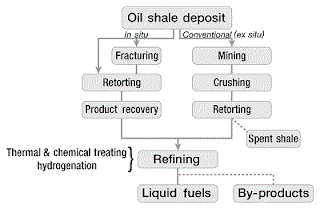 |
| Oil Shale Extraction |
We aren't quite sure where "admin" came up with this information, but wherever that was, s/he either misinterpreted key facts or found a resource full of bullshit. No knowledgeable scientist would make this claim:
"...Shale oil contains relatively large quantities of sulfur, nitrogen, and oxygen than that of crude oil. But, the cost of production of shale oil is comparatively low."
We only included the first phrase to demonstrate admin's composition skills. The second phrase, however, is completely wrong: though there are vast reserves of so-called shale oil (a misnomer for what is more commonly called oil shale), the costs of obtaining usable hydrocarbons from the raw stock on a large scale is prohibitive.
According to admin,
"The production of shale oil is a great achievement for the global oil crisis. Because, it is a relatively low cost unconventional resource, it can be spread all over the world to address the global energy problem."
We're not certain where Olivia(?) came by her information; but her statement is, unfortunately, utter bullshit; not to mention the idea of oil being "spread all over the world" should give even the most pro-fossil fuel Texan cold chills. It won't happen, though, because the cost of converting oil shale to refinable products remains prohibitive.
Admin's problem, besides near-total ignorance of the science, is that s/he fell victim to a common misconception. "Shale oil" is not what admin called "light tight [sic] oil"; that term refers to crude oil produced from low-permeability reservoirs; e.g., the Bakken Shale. Shale oil is, in fact, immature kerogen in fine-grained rock, usually lacustrine, such as the Green River Formation of the western USA. Even the tight oil formations are not, despite her claims, "a relatively low cost unconventional resource" given that costly hydraulic fracturing is usually required to produce the reservoirs.
Pretty much the only information admin provided that is of much use is the description she parroted (from a LinkedIn post about tires!) of pyrolysis, the process used to convert oil shale to usable hydrocarbons. The result is a mashup of information about immature kerogen-rich sedimentary rocks (oil shales) and petroleum produced from shale reservoirs (tight oil, aka shale oil). As is so often the case at this site, our Dumbass of the Day didn't know enough about the topic to know where she sent wrong.
Note: our DotD included a pretty picture of sideritic laminae (two words she probably didn't understand) in oil shale; presumably assuming that the wet surface was the oil leaking out. In fact, the photographer stated that the "Contrast of the rock is enhanced by water." Duh.
SI - OIL
No comments:
Post a Comment